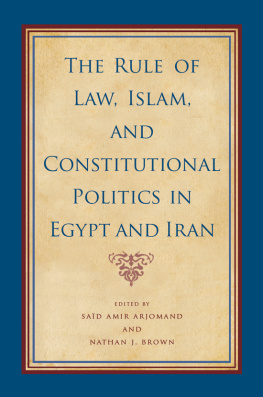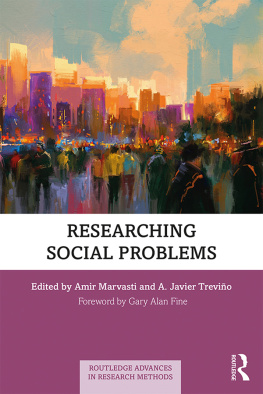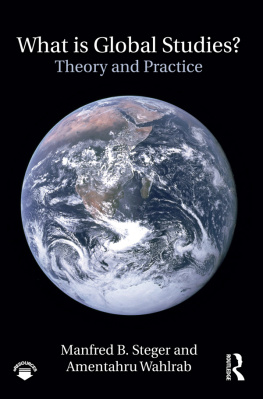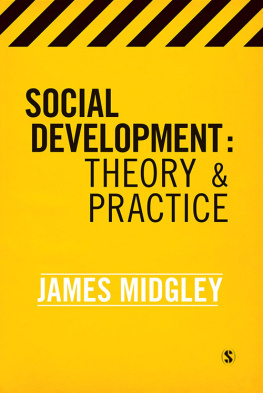Social Theory and Regional Studies
in the Global Age
SUNY series, Pangaea II: Global/Local Studies
_________
Sad Amir Arjomand and Wolf Schfer, editors
Social Theory and Regional Studies
in the Global Age
Edited by
Sad Amir Arjomand
Published by State University of New York Press, Albany
2014 State University of New York
All rights reserved
Printed in the United States of America
No part of this book may be used or reproduced in any manner whatsoever without written permission. No part of this book may be stored in a retrieval system or transmitted in any form or by any means including electronic, electrostatic, magnetic tape, mechanical, photocopying, recording, or otherwise without the prior permission in writing of the publisher.
For information, contact State University of New York Press, Albany, NY
www.sunypress.edu
Production by Eileen Nizer
Marketing by Kate McDonnell
Library of Congress Cataloging-in-Publication Data
Social theory and regional studies in the global age / edited by Sad Amir Arjomand.
pages cm. (Pangaea II : global/local studies)
ISBN 978-1-4384-5159-6 (hardcover : alk. paper)
1. Sociology. 2. Social sciencesPhilosophy. 3. GlobalizationSocial aspects. I. Arjomand, Sad Amir.
HM585.S576 2014
301dc23
2013025546
10 9 8 7 6 5 4 3 2 1
To the memory of Shmuel Noah Eisenstadt (19232010)
Contents
Sad Amir Arjomand
P ART I
C OMPARATIVE S OCIOLOGY , C IVILIZATIONAL A NALYSIS, AND R EGIONAL S TUDIES
Sad Amir Arjomand
Bjrn Wittrock
Edward A. Tiryakian
Willfried Spohn
Wolf Schfer
P ART II
H ISTORICIZING A XIAL S HIFTS AND P ATTERNS OF E VOLUTION AND M ODERNIZATION
Johann P. Arnason
Sad Amir Arjomand
Donald N. Levine
Gran Therborn
P ART III
W ORLD R EGIONS , C OLONIAL AND S UBALTERN M ODERNITIES IN THE G LOBAL P ERIPHERY
Peter Wagner
Wolfgang Knbl
Jeremy C. A. Smith
Manuela Boatc
Babak Rahimi
Thomas Kern, Lotta Mayer, and Sang-hui Nam
Sujata Patel
Foreword
Pangaea II: Global/Local Studies
This book series of the Stony Brook Institute for Global Studies engages the global challenges confronting humankind with research, analysis, and education. It aims at empowering individuals and communities to enjoy the benefits and avoid the dangers of globalization. Without political partisanship, the Stony Brook Institute for Global Studies will form worldwide partnerships with those who appreciate the vital contribution of academic excellence to achieving these aims. In so doing, it should also contribute to the extension of human rights, security, freedom, and democracy in accord with the diversity of values and cultures throughout the world.
A civilizational project of the global age, Pangaea II is emerging on the scattered geobody that our world maps depict. Pushed forward by globalization and technoscience, Pangaea II is eclipsing the configurations of nature. For the ubiquitous images, sounds, and texts of Pangaea II, earths current fragmentation into regions, cultures, continents, and islands has vanished. Rapidly branching communication and transportation networks are interweaving widely distributed societies. TV, telephony, and e-mail have escaped from the gravity of the geobody. Pangaea II is pulling the planet together and colonizing near-earth space. Vanquishing the geographic difference between halfway down the corridor and halfway around the globe, Pangaea II is a dense global conglomeration with physical and metaphysical features such as the routers of the Internet and the fallacious belief that global communication should be easy because it has become instant.
Pangaea II: Global/Local Studies is committed to interdisciplinary social science and the integration of fact and theory in a global context. As the hegemony of the Western center of the world system wanes, and with it that of metropolitan social theory, pluralistic approaches to research grow and multiple centers of learning around the globe emerge. We believe in opening the social sciences, removing old disciplinary boundaries, and exploring the intricate dialectic of the global and the local in the production of knowledge. This series embraces the epistemic challenge of the global age; it privileges comparative and interdisciplinary approaches to illuminate the simultaneous local generalization of the global and the global constitution of the local. Understanding this dialectic at the core of globalization and globality is the goal of Pangaea II. Accordingly, the global/local studies published under Pangaea II combine comparative, universal theorizing with various approaches to local knowledge on national and regional topics.
Sad Amir Arjomand and Wolf Schfer
Preface
The project for integrating social theory and regional studies was an inaugural program of the Stony Brook Institute for Global Studies, and is appropriately appearing in its publication series, .
An earlier version of chapter 5 appeared in the Institutes electronic journal, Globality Studies (globality.cc.stonybrook.edu/?p=158). An earlier version of chapter 1 was published under the same title in the Archives eruopennes de sociologie 51, no. 3 (2010): 36399, and I am grateful for the permission of its editor to include it in this volume.
Sad Amir Arjomand
Introduction
The Challenge of Integrating Social Theory and Regional Studies
Sad Amir Arjomand
The recognition of the simultaneous emergence of the natural and then social sciences and the formation of modernity in Western Europe is the inescapable starting point for any theorist wishing to lay a claim to the understanding of modernity in whatever form, be it modernity heavy, as in Habermass Enlightenment project of modernity that represents a sociologized version of central value-ideas of the Western Age of Reason, or modernity lite, whose variants include multiple, alternative, connected, entangled, and subaltern modernities examined in this volume. Social theory as born in Europe was the theory of modern society, a term that is only recently being replaced by modernity. What I call modernity heavy implies that there is no significant change beyond it in history, in effect making the concept of modernity refer to only a single and unique experiencethat of the West. Much of the criticism it has provoked for doing so, however, tended to discard rather than aim to rethink key concepts of the social sciences (Wagner 2009, 24849). The varieties of modernity lite presented in this volume are, by contrast, attempts to rethink and qualify rather than reject and discard the concept of modernity. A set of chapters on comparative analysis of civilizations goes even further, proposing to decenter modernity in social theory altogether by historicizing it as a distinct evolutionary or developmental pattern.
I
The late Reinhard Koselleck, the German historian who did more than anyone to establish conceptual history as a discipline in the latter part of the twentieth century, saw the late eighteenth and early nineteenth century in Western Europe as the saddle period (









